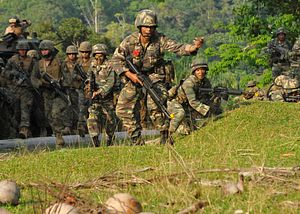On August 17, the United States and Malaysia kicked off a bilateral naval exercise in Sandakan in eastern Malaysia.
The 21st annual Cooperation Afloat Readiness and Training (CARAT) Malaysia exercise is designed to address shared maritime security concerns, build relationships and enhance interoperability between U.S. and Malaysian Armed Forces. It is part of a series of bilateral naval exercises conducted by the U.S. Navy with partners and now involves nine countries in South and Southeast Asia – Bangladesh, Brunei, Cambodia, Indonesia, Malaysia, the Philippines, Singapore, Thailand and Timor-Leste (See: “US Eyes Expanded Military Exercises with ASEAN Navies”).
CARAT Malaysia 2015 will involve more than 1,000 U.S. military members alongside counterparts from the Malaysian Armed Services. It consists of five days of shore-based and at sea training events through August 21. According to a statement by the U.S. Navy seen by The Diplomat, the exercise will feature simultaneous amphibious landings, surface warfare drills, visit, board, search and seizure (VBSS) demonstrations, explosive ordnance disposal training, maritime patrol and reconnaissance operations, a gunnery exercise, coastal riverine drills, and civil engineering projects between U.S. Navy Seabees and Malaysian partners. Personnel from both nations will also exchange best practices on naval tactics during a series of military seminars on shore.
U.S. units participating in the exercise include the littoral combat ship USS Fort Worth, the dock landing ship USS Germantown, a P-3C Orion, a Naval Mobile Construction Battalion , a Explosive Ordnance Disposal Mobile Unit, a Coastal Riverine Group, and U.S. Marines assigned to the 3rd Marine Expeditionary Brigade.
According to the U.S. Navy, after more than two decades of annual CARAT training engagements between the U.S. and Malaysian Armed Forces, the exercise remains “a model for cooperation that has evolved in complexity and enables both nations to refine maritime operations and tactics.”
“CARAT is a practical way for our two navies to address shared maritime security priorities in a realistic training environment,” said Capt. H.B. Le, Commodore, Destroyer Squadron 7. “The Malaysian Armed Forces have been a part of CARAT since its inception, and our partnership’s spanning more than two decades demonstrates a firm mutual commitment to stability and security throughout the region.”
































